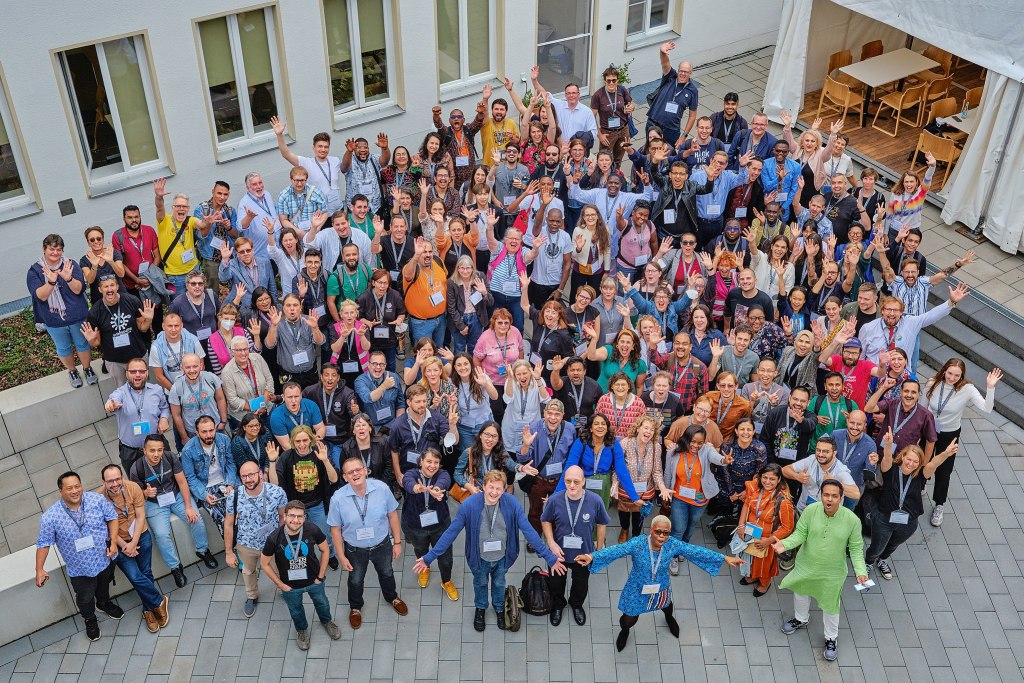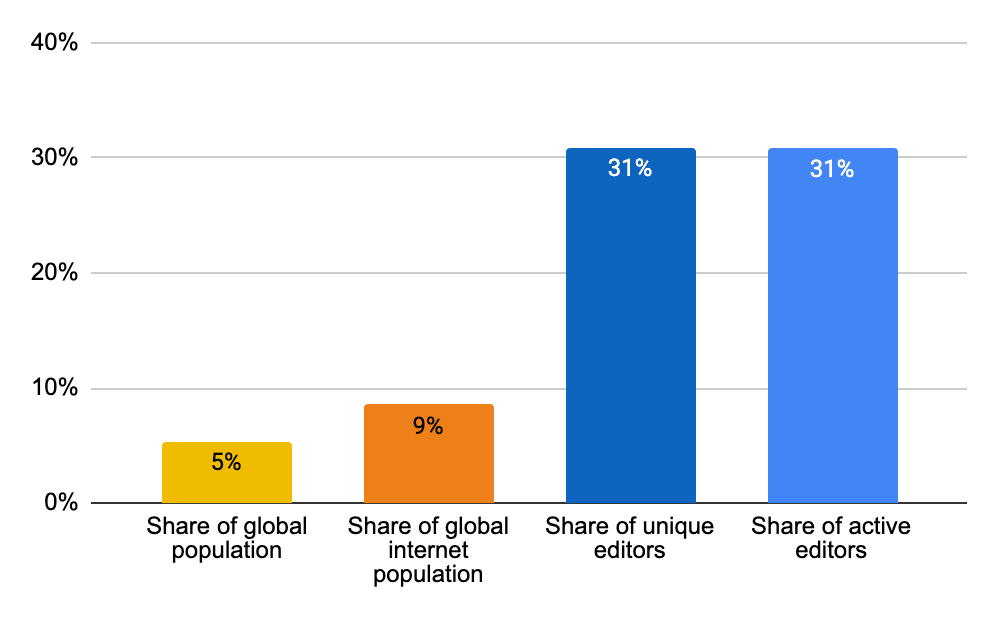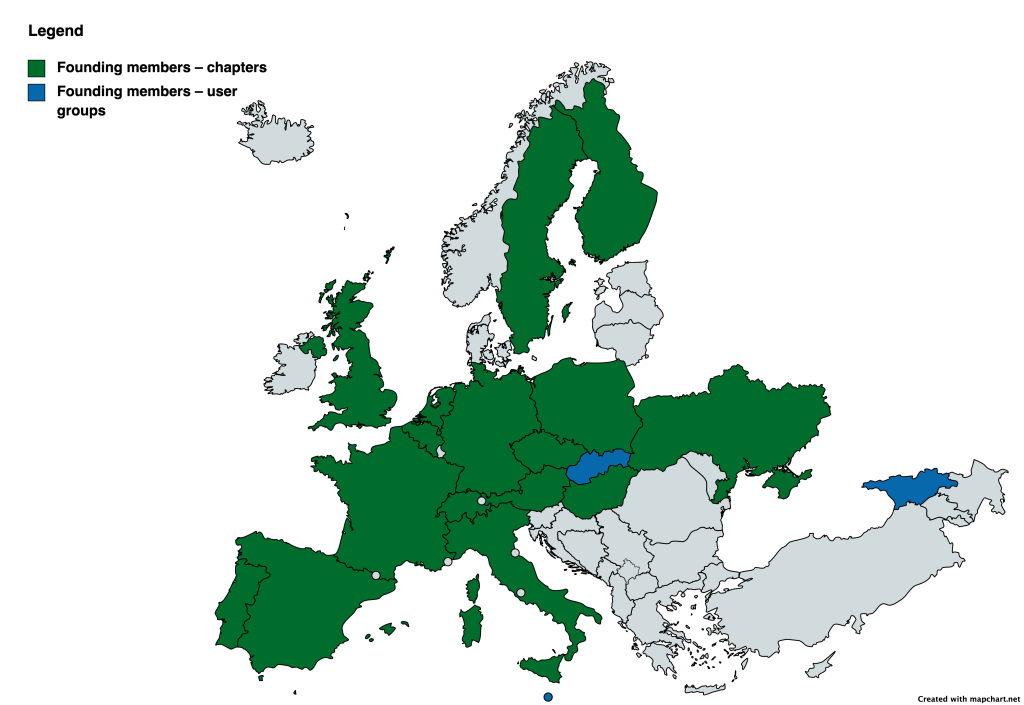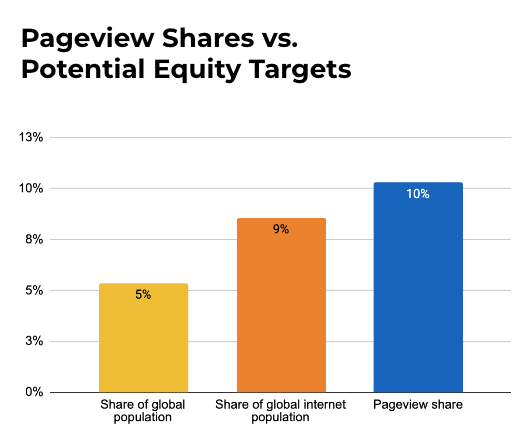
The Wikimedia community in Northern and Western Europe (NW Europe) is one of the oldest and most established communities in the Wikimedia movement. Spanning 26 countries, the region is home to some of the largest reader and contributor populations in languages other than English, who continue to contribute and help shape our unique movement. It is also responsible for the earliest internationalization of Wikipedia – German, Catalan, and French Wikipedias were created two months after English Wikipedia, with Swedish Wikipedia in short succession. Combined with a strong presence of Wikimedia chapters and experienced movement organizers, Northern and Western Europe is a powerhouse when it comes to sharing free knowledge, and advocating for change to do so more equitably.
As part of the Wikimedia Foundation’s new approach to annual planning, we’re sharing updates about the movement’s work across regions. Let’s take a deeper look at Northern and Western Europe.
Contributors
Northern and Western Europe plays an outsized role in Wikimedia contribution compared to its share of the global population. The region is digitally advanced and well connected compared to many other parts of the world; while it has 5% the global population, it is a full 9% of internet users. This trend is even more stark when it comes to Wikimedia, where 31% of global editors live in NW Europe. Such strong participation in free language contribution underscores what a significant role European languages, culture, and topics play on the wikis.

Yet within this broad grouping of 26 diverse countries, there is significant variation in population size, land mass, and language. The largest language communities have about 8,000 members, while the smallest have closer to 80. These dimensions tend to play out in terms of the contributor communities, where most editors, particularly in languages other than English, are concentrated in larger more populous countries with a national language. Some examples include:
- Italian Wikipedia is primarily edited from Italy, which is home to 6,000 of 7,000 global editors.
- Swedish Wikipedia is primarily edited from Sweden, which is home to 720 of 1,000 global editors.
- Finish Wikipedia is primarily edited from Finland, which is home to 690 of 1,000 global editors.
- Norwegian Wikipedia is primarily edited from Norway, which is home to 420 of 630 global editors.
- Dutch Wikipedia is primarily edited from the Netherlands, which is home to 930 of 2,000 global editors. (Belgium is in second place with 390 editors).
- Germany is home to 5,000 of the approximately 7,000 global editors on German Wikipedia
The United Kingdom, Spain, France and Portugal all spread their languages around the world through colonization, and now these languages reflect differing patterns in terms of where editors are based. Most editors of Portuguese Wikipedia live in Brazil, not Portugal, while a plurality of editors from Spanish Wikipedia live in Spain (3,000 of 10,000 global editors). Spain is also the nearly exclusive home to small language communities from other languages spoken in Spain, such as Catalan (670 of 1,000 global editors), Basque (280 of 430 global editors), and Aragonese (20 of 40 global editors). Despite the widespread use of French around the world, most editors of French Wikipedia live in France (5,000 of 8,000 total). Unsurprisingly, only 6,000 of 56,000 global active editors to English Wikipedia are in the UK, placing the country between the United States (22,000 editors) and India (4,000 editors).
Finally, the far northern countries away from mainland Europe have very small editor populations for local languages, most of whom seem to live abroad. Only 10 of 80 global editors to Faroese Wikipedia live in the Faroe Islands, and 30 of 120 editors of Icelandic Wikipedia live in Iceland. In Greenland, the local languages of Kalaallisut (30 editors) has no editors at all – they are evenly split between Brazil, Poland, and the United States with 10 editors each.
Affiliates
Northern and Western Europe is home to over 33 Affiliates groups, including 14 chapters, and one of the two thematic organizations in the movement: Amical Wiki. In total, this wide variety of affiliates makes up about 20% of movement affiliates globally, and 37% of all chapters.
The large number of chapters in the region is no surprise, considering that this is the region in which the first chapter – Wikimedia Deutschland – was created in 2004. It was followed shortly by two other chapters from the region: Wikimedia France and Wikimedia Italia. These chapters are independent, legally incorporated organizations working within a specific geographic focus. They are mature entities, typically have at least at least 20 members, employ their own staff benefit from diverse funding sources.
With more than 100 000 members, Wikimedia Deutschland is not only the oldest, but also the largest chapter in the movement, and is active globally. For example, it supports Wikidata, the fastest growing Wikimedia project, and strongly supports Movement Strategy efforts, including playing a leadership role in advancing the second phase of the movement strategy process. Wikimedia Deutschland’s Movement Strategy and Global Relations team publishes papers around different strategy elements, and the MOVE podcast aims to be an easy and interesting source of information about everything strategy-related.
Similarly, other chapters in the region are also heavily engaged in global affairs. For example, Wikimedia Austria works to transfer capacities to other regions or affiliates through fiscal sponsorship, and Wikimedia Norge organizes the Language Diversity Hub. All of the regional affiliates work towards furthering the movement’s mission and vision through projects, engaging the local community of editors, and advancing the movement’s 2030 Strategy.
Regional Grantmaking
Looking at the history of grantmaking in the region, Northern and Western Europe has received over $37.2 million in annual grants since 2009. In 2022 the region received around $3.83 million in grants (which is an increase from 3.24 in 2021). This region has the highest participation in the Foundation’s grants program. Moving forward, the NW Europe affiliates have established an important goal of diversifying resources and developing additional fundraising strategies.
Grant-funded activities in Northern and Western Europe span a wide range from reducing knowledge gaps and increasing the diversity of contributors to the Wikimedia projects in Norwegian Bokmål, Norwegian Nynorsk and Northern Sámi, to General Support Fund grants in a variety of countries, as well as research grants like working on Wikidata Gender Diversity.
The region has an especially strong tendency to prioritize work in the GLAM (Gallaries, Libraries, Archives and Museums) arena. The affiliates of NW Europe work with many cultural institutions, both large and small. For this reason, it is unsurprising that that the thematic hub working on providing tools and services around content partnerships is being created in NW Europe! Developed by Wikimedia Sweden, the Content Partnerships Hub will support work across the globe, and provide, among other services, a partnership helpdesk, which will offer mentorship and support to anyone working on establishing partnerships.
Affiliates and communities in the region have long been engaged in public policy advocacy on a regional level, helping to shape European policies that affect our movement. In 2013, affiliates engaged in policy work established an entity with a long name and noble goals. The Free Knowledge Advocacy Group EU have worked in Brussels to monitor EU policy, inform Wikimedia entities, facilitate movement discussions around public policy, and most importantly, help EU legislators understand the distinctive approach towards free knowledge and content moderation taken by the Wikimedia movement. They have also laid the foundation for Wikimedia Europe – a brand new entity in the Wikimedia Movement set up to further its policy goals in the European Union.

WMEU, created by more than 20 affiliates from the region, will be a Belgium-registered organization, with an aim of shaping European legislation and regulation that affect free knowledge and access to information, supporting affiliate fundraising, and building more movement capacity in that area.
Readers
Readership in NW Europe is strong, with countries in the region making up a full half of the top ten countries by total monthly pageviews. The United Kingdom (950 million pageviews) is in third place behind the US and Japan, followed by Germany (906 million pageviews) in 4th place, France (609 million pageviews) in 6th place, Italy (536 million pageviews) in 7th place, and Spain (326 million pageviews) in 10th place.

These pageviews matter – Wikipedia and other Wikimedia projects are how readers all around the world gain access to free knowledge, and that knowledge is available in hundreds of languages. The Wikimedia projects are also a reflection of the beliefs and information that we share collectively across languages and borders. So what are people in NW Europe reading about for the month of November 2022?
Unsurprisingly, topics related to the World Cup are high on the list! The Netherlands, England, Wales, Poland, France, Denmark, Germany, Spain, Belgium, Switzerland, Portugal all played in the world cup this year. The respective content pages about the FIFA World Cup are the most viewed content pages in Italian Wikipedia (“campionato mondiale di calcio” with over 1,500,000 views), German Wikipedia (“Fußball-Weltmeisterschaft 2022” with over 1,300,000 views), and Polish Wikipedia (“Mistrzostwa Świata w Piłce Nożnej 2022” with over 1,600,000 views). French Wikipedia, however, takes the prize for the greatest football enthusiasm. The current top article,“Coupe du monde de football 2022”, has nearly 2 million views, followed by “Qatar” with nearly 600,000 views, and the page for French football coach, Hervé Renard, who manages the Saudi Arabia national team and has over 500,000 views.
Conclusion
So how can the Wikimedia movement build on and support the ongoing work of volunteers and affiliates in Northern and Western Europe? Within the Wikimedia Foundation, we are working to understand how we can better grow audiences and contributors as well as support our affiliates within specific areas. Some questions we are looking at include:
- How can we build on the work around GLAM and the gender-gap being led from NW Europe?
- What capacity building support is needed for affiliates to achieve financial sustainability beyond the grants programme?
- What does it take to grow and diversify readership within the region?
- How can European chapters better support more nascent affiliates within and outside the region?
- What voices are missing in existing efforts? Are there existing partnerships worth strengthening or new ones worth building?
Please share your thoughts on what’s missing in the comments below, and we will share an update in the coming months.

Can you help us translate this article?
In order for this article to reach as many people as possible we would like your help. Can you translate this article to get the message out?
Start translation